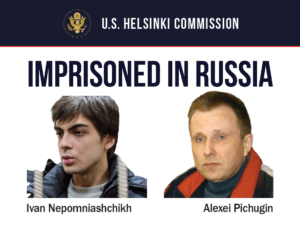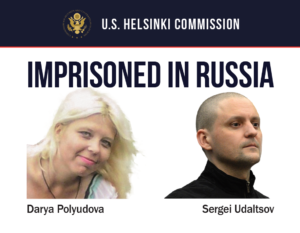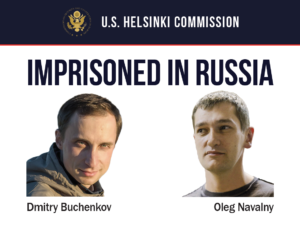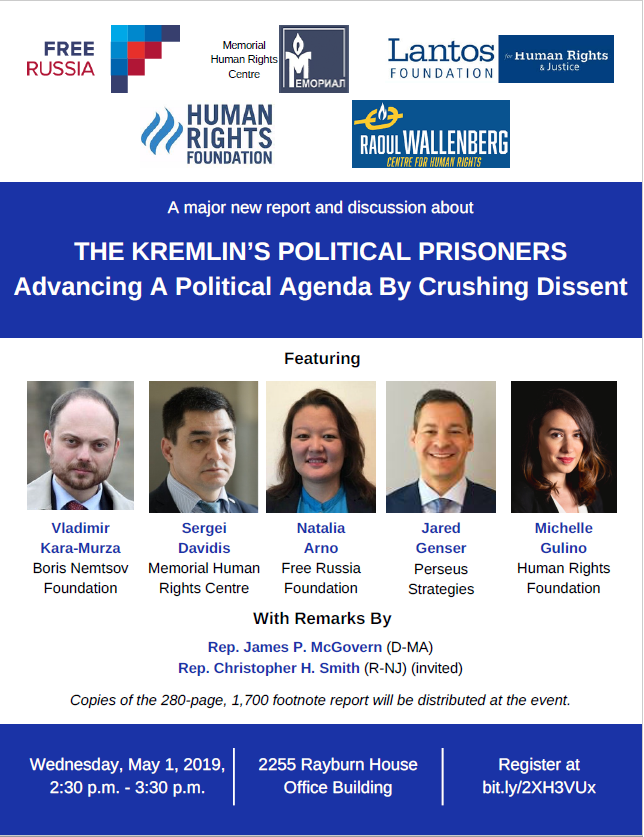 In his Nobel Peace Prize lecture in 1975, Soviet dissident Andrei Sakharov listed the names of over 120 political prisoners he knew of at the time. Now the Russian human rights group Memorial has come up with a current list of 278 names. Both those tallies are low estimates, says a Russian human rights activist, NPR’s Michele Kelemen observes.
In his Nobel Peace Prize lecture in 1975, Soviet dissident Andrei Sakharov listed the names of over 120 political prisoners he knew of at the time. Now the Russian human rights group Memorial has come up with a current list of 278 names. Both those tallies are low estimates, says a Russian human rights activist, NPR’s Michele Kelemen observes.
“And if we compare those two estimates, then there are more political and religious prisoners in Vladimir Putin’s Russia today than there were in Brezhnev’s Soviet Union in 1975,” Vladimir Kara-Murza says.
 Several individuals profiled in the Helsinki Commission’s April 2017 hearing, “Democracy & Human Rights Abuses in Russia: No End in Sight,” illustrate the many cases of political prisoners in Russia today.
Several individuals profiled in the Helsinki Commission’s April 2017 hearing, “Democracy & Human Rights Abuses in Russia: No End in Sight,” illustrate the many cases of political prisoners in Russia today.
Recent grim socio-political developments inside Russia warrant a closer look at the Kremlin’s actions at home and their implications for the Russian government’s influence abroad, Freedom House adds.
Increasing attempts to control free speech and online communication, a continuing assault on human rights defenders, civic organizations and activists, and a rekindled desire to manage youth under the pretext of preventing radicalization are evident against the backdrop of Putin’s stagnating approval ratings and slumping national economy. The Kremlin boldly exports the authoritarian methods that it has perfected with impunity within its own borders, influencing other leaders, spreading illiberal policies abroad, and provoking doubt and disillusionment in democratic countries, including the United States.
Are the existing accountability mechanisms in the U.S. effective against the expansion of Russia’s undemocratic practices and influence? Are undemocratic actions by the Kremlin within its borders an obstacle at all to productive engagement with Russia on economy, trade, nuclear security and energy independence? How can the United States’ engagement with and policy toward Russia be effectively informed by the implementation of international agreements and multilateral accountability mechanisms in which it participates?
 Fostering Principled Engagement With Russia
Fostering Principled Engagement With Russia
Speakers: Vladimir Kara-Murza, vice chairman of Open Russia; Wolfgang Benedek, professor emeritus of international law at the University of Graz; Maria Kanevskaya, founding board member of the Human Rights Resource Center; Marc Behrendt, director of Europe and Eurasia programs at Freedom House; and Kyle Parker, senior staff representative at the U.S. Helsinki Commission.
May 2, 2019
10:30 a.m. – 12:00 p.m.
Dirksen Senate Office Building
Room 562 (Senate Commerce Committee room)
50 Constitution Ave NE,
| Wednesday, May 1, 10:00 a.m. |
| 2172 Rayburn Bldg. |
Countering a Resurgent Russia
House Foreign Affairs Committee (Chairman Eliot L. Engel, D-N.Y.) hearing on “Countering a Resurgent Russia.”
| Victoria Nuland,* nonresident senior fellow for foreign policy in the Brookings Institution’s Center on the United States and Europe and former assistant secretary of State for European and Eurasian affairs and former United States permanent representative to NATO; Daniel Fried*, distinguished fellow in the Atlantic Council’s Future Europe Initiative and Eurasia Center and former assistant secretary of State for European and Eurasian affairs and former United States ambassador to Poland;Retired Army Gen. Jack Keane, chairman of the Institute for the Study of War and former acting chief of staff and vice chief of staff of the U.S. Army.
*Board members of the National Endowment for Democracy. |








